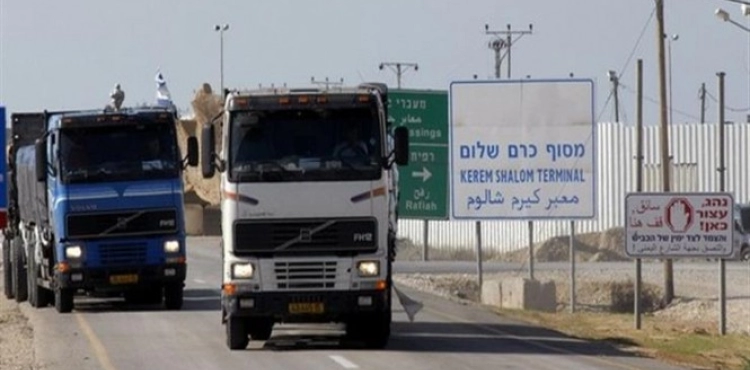The Palestinian Center for Human Rights called on the international community, today, Sunday, to intervene to prevent the Israeli occupation from imposing new restrictions and obstacles on the movement of exports and imports through the Kerem Shalom crossing, and to prevent the fulfillment of its requirements represented in changing the standards for marketing some agricultural products. Which negatively affects the quality of the Palestinian product and weakens the opportunities to market these products outside Gaza, which further exacerbates the deteriorating economic situation.
In a statement, PCHR indicated that the Israeli occupation authorities continued to use the policy of collective punishment imposed on the residents of the Gaza Strip, including tightening procedures on the movement of exports and imports to and from the Gaza Strip, which led to a serious deterioration in the civilian population´s enjoyment of their economic and social rights.
He pointed out that the latest form of this policy, the occupation authorities imposed impossible conditions in front of major traders and farmers in the Strip, obligating them to remove the green neck of tomatoes before exporting them.
This condition, which the farmers denounced, came after they were prevented from marketing their products outside the Gaza Strip for more than a month after the end of the aggression on Gaza, which cost them $16 million, other than the heavy losses resulting from the Israeli air force targeting various agricultural lands and facilities.
In a press statement, the Ministry of Agriculture in Gaza stated that the Israeli occupation authorities stipulated that the tomato crop be marketed without the “repression” neck, which affects the quality of the fruit and shortens its life, as this condition was set after the farmers of the sector incurred heavy financial losses as a result of closing The occupation of the Kerem Shalom crossing and the prevention of the transfer of agricultural products from the Gaza Strip to foreign markets for nearly 45 days.
The Center indicated that since the occupation announced the resumption of work at the crossing, on the 22nd of this month, it was allowed to export limited varieties of agricultural products amounting to 110 tons of vegetables, including 30 tons of tomatoes, before the occupation surprised Palestinian farmers with its incapacitating condition related to the neck of a fruit. Tomatoes, which farmers refused and announced that they would stop exporting their agricultural products.
Senior agricultural traders believe that the Israeli occupation is fighting their products by setting this condition, which leads to an increase in material costs to farmers and the rapid deterioration of the tomato fruit due to the removal of the green cover from it, in addition to the incompatibility of this matter with the desire of consumers in foreign markets that demand tomatoes in the form of cuts. Or clusters show that they are fresh, as in some varieties.
He stressed that the occupation authorities are still imposing a ban on the export of products from the Gaza Strip, and with a limited exception, they allow the export of very limited quantities of some goods, most of which are exported to the West Bank, and the other small quantities to Israel and some countries of the world.
After a complete closure that lasted for more than a month in the wake of the last war offensive in May 2021, the occupying authorities allowed the export of some agricultural products such as vegetables, in addition to limited quantities of clothing, which leads to a deterioration of conditions in economic facilities, especially workers in the agricultural sector, where they have become Unable to meet the basic needs of their families, after their lands were bombed and destroyed during the recent aggression, and they were affected by successive economic crises, and hundreds of them joined the ranks of the unemployed. As stated in the statement of the center.
The Palestinian Center for Human Rights described the latest facilities from the occupation, whether at sea or at the crossings, as cosmetic.
He pointed out that the occupation authorities are still preventing the supply of fuel needed to operate the only power plant in the Gaza Strip, which increases the financial burden on these facilities, leading to the suspension of their work.
PCHR called on the international community and the high signatories to the Geneva Conventions to compel the Israeli authorities to stop using the policy of collective punishment that they impose on the residents of the Gaza Strip, including tightening and closing the Gaza border crossings, which lead to a threat to their food security and a serious deterioration in their economic rights. and social security for the civilian population in the Strip.












